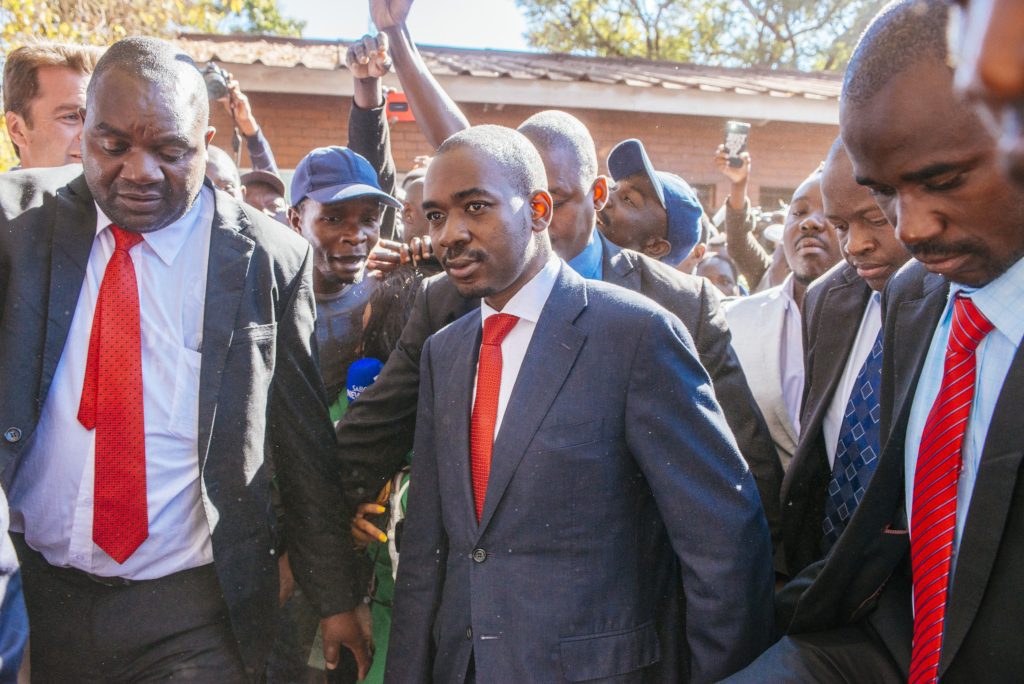Nelson Chamisa, the leader of Zimbabwe’s main opposition party, said he’s confident of an emphatic win in upcoming elections despite concerns of a possible repetition of the violence and irregularities that have plagued every vote since 2000.
The contest will likely take place in July or August, and Chamisa, 45, will be the presidential candidate for the Citizens Coalition for Change, or CCC, which was formed last year. He’ll present the biggest challenge to President Emmerson Mnangagwa, 80, who leads the ruling Zimbabwe African National Union-Patriotic Front and is running for a second five-year term.
The elections come at a time when the southern African nation is mired in the latest in a series of economic crises. Its currency has lost 86% of its value over the past year and even more on the black market, the inflation rate stands at 230% and millions of its citizens have emigrated because they can’t make a living.
Still, Zanu-PF has retained power since independence in 1980 despite widespread public anger over bouts of hyperinflation and shortages of food and fuel, with Western nations alleging that it has stolen a series of elections over the past two decades. The ruling party has denied wrongdoing.
“Mnangagwa is panicking,” Chamisa said in an interview last week. “The crocodile is feeling the boiling water, and we will continue to turn the heat on,” he said referring to the president’s nickname, which he got from his role in the country’s liberation struggle in the 1960s and 1970s.
Violent election
The CCC is one of several offshoots from the Movement for Democratic Change, which successfully campaigned against former President Robert Mugabe in a referendum in 2000 designed to increase his powers.
The plebiscite was followed by a violent election later that year and the state-sanctioned seizure of White-owned commercial farms by bands of militants. That set a pattern for future votes, ushered in an economic collapse and triggered sanctions by the European Union, the US and other nations against many of Zimbabwe’s senior politicians and state firms.
While the CCC is prepared for electoral interference, Zanu-PF’s unpopularity will hand victory to the CCC, said Chamisa, a lawyer who led the MDC before it’s latest split in 2021. A survey by the Sabi Strategy Group released this month showed Chamisa would win 53% of a fair vote, compared with 40% for Mnangagwa, and their parties would garner similar support in a concurrent parliamentary election.
“We are building mechanisms to defend citizens within communities,” Chamisa said, without giving details. “This time no amount of rigging, manipulation or an attempt to avert the will of the people is going to stand. Citizens are ready to speak and speak boldly.”
Mike Bimha, Zanu-PF’s political commissar, said his party remains confident of winning the election and dismissed concerns that it might not be free and fair.
If the CCC does take power, it will focus on reforming the currency regime and central bank, tackling rampant corruption and slimming down the 24-member cabinet to no more than 15 ministers, according to Chamisa. It also intends finding a way to resolve an impasse over Zimbabwe’s $13 billion of external debt and arrears owed to international financial institutions.
Debt restructuring
“We need to also undertake a very comprehensive debt audit and validation process to ensure that whatever we have is an accurate reflection” of what is owed, he said. “Having done that, we need to approach multilateral institutions with a proposed debt restructuring backed by a credible blueprint,” he said, adding that if corruption is staunched the debt can be repaid within six years.
A new administration will issue title deeds to Black farmers who lack proper tenure, including those who were resettled on land seized from White landowners, so that they can develop their properties, Chamisa said. He also pledged to compensate those whose land was seized — an undertaking that Zanu-PF has made, but is yet to deliver on.
The CCC will also ensure property rights are respected and plans to adopt a favorable tax regime for the mining industry. Zimbabwe has the world’s third-largest platinum group metal reserves as well as deposits of lithium, gold and iron ore.
“We want to make mining attractive for investors,” Chamisa said. “Fundamental reforms” will be implemented to simplify taxes and make it easier to invest, he said.
© 2023 Bloomberg

